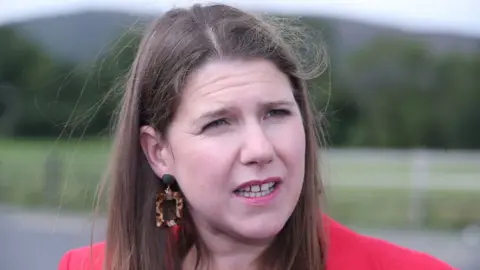Corbyn: UK parliament should not block Indyref2
Jeremy Corbyn has said the UK parliament should not block a second Scottish independence vote - but he does not think "it is a good idea".
The issue has sparked a row in the Labour party in recent weeks after similar comments from John McDonnell.
The official policy of Scottish Labour is still to oppose such a vote.
The Labour leader said: "It's not up to parliament to block it but it's up to parliament to make a point about whether it's a good idea or not."
First Minister Nicola Sturgeon welcomed Mr Corbyn's comments, but said he was "just stating basic democracy".
Mr Corbyn was echoing the views of his shadow chancellor, Mr McDonnell, who was criticised by several senior Scottish Labour figures after speaking out at an Edinburgh Fringe event.
Mr McDonnell said the "English parliament" should not stand in the way of a referendum "if the Scottish people decide" they want one - although he conceded that "there are other views within the party".
Scottish party leader Richard Leonard said he had spoken to Mr McDonnell to "put to him the very clear view that the people of Scotland do not want a second independence referendum and also to remind him that the last independence referendum was supposed to be once in a generation".
Asked if he agreed with Mr McDonnell, Mr Corbyn said: "My view is that I'm not in favour of Scottish independence, the referendum did take place and a decision was reached on that."
However, he said he did not think it was up to the UK Parliament to block an independence referendum.
He added: "I would advise that we don't have another referendum. I'm not in support of Scottish independence. What I am in support of is justice for Scotland and that means investment in Scotland by a Labour government for the whole of the UK."
A spokesman for Scottish Labour said: "Jeremy Corbyn and Richard Leonard have made clear that there is no economic case for independence, especially with the SNP's new position of ditching the pound and new policy of turbo-charged austerity to bear down on the deficit."
Ms Sturgeon welcomed Mr Corbyn's refusal to block a referendum, adding: "It's perfectly legitimate to oppose independence, as he does, it's perfectly legitimate to argue against there being a second referendum.
"What's not legitimate is for Westminster to block a mandate as now exists for a second referendum, and to seek to block majority opinion in the Scottish Parliament."

There has been speculation that Labour and the SNP are moving towards an agreement to join forces at Westminster in an attempt to remove Boris Johnson from Downing Street.
On Wednesday, Mr Corbyn wrote to opposition leaders at Westminster and Tory rebels outlining a plan to table a no-confidence vote "at the earliest opportunity when we can be confident of success".
If passed, he suggested he would then become leader of a "strictly time-limited" caretaker government, pending a general election.
Ms Sturgeon said she would "work with anyone and explore any option to stop Brexit", saying that while she was "not a great fan of Jeremy Corbyn" she "won't rule out any option if it helps to avert what is a looming catastrophe of no-deal Brexit".
Questioned about the SNP backing a Labour government, the party leader said: "Labour and the SNP are political opponents. But if we cast our minds back to the 2015 and 2017 general elections, I made clear that if the arithmetic lent itself to this, I would want the SNP to be part of a progressive alternative to a Tory government.
"I don't foresee or envisage a formal coalition between the SNP and Labour, I don't think that's what we'd be looking at. But we're talking hypothetically here, we don't know what the arithmetic will be after a general election, but I want to see this Tory government out of office because they are doing real damage."
 PA Media
PA MediaBut the Liberal Democrat leader Jo Swinson said Mr Corbyn was not the right person to build "even a temporary majority" in the Commons.
She said: "I would expect there are people in his own party and indeed the necessary Conservative backbenchers who would be unwilling to support him. It is a nonsense."
Other party leaders have also taken issue with parts of the proposal, with the Greens and Plaid Cymru calling for a new EU referendum to come before a general election.
Downing Street accused the Labour leader of planning to "overrule" the UK's vote to leave the EU.
